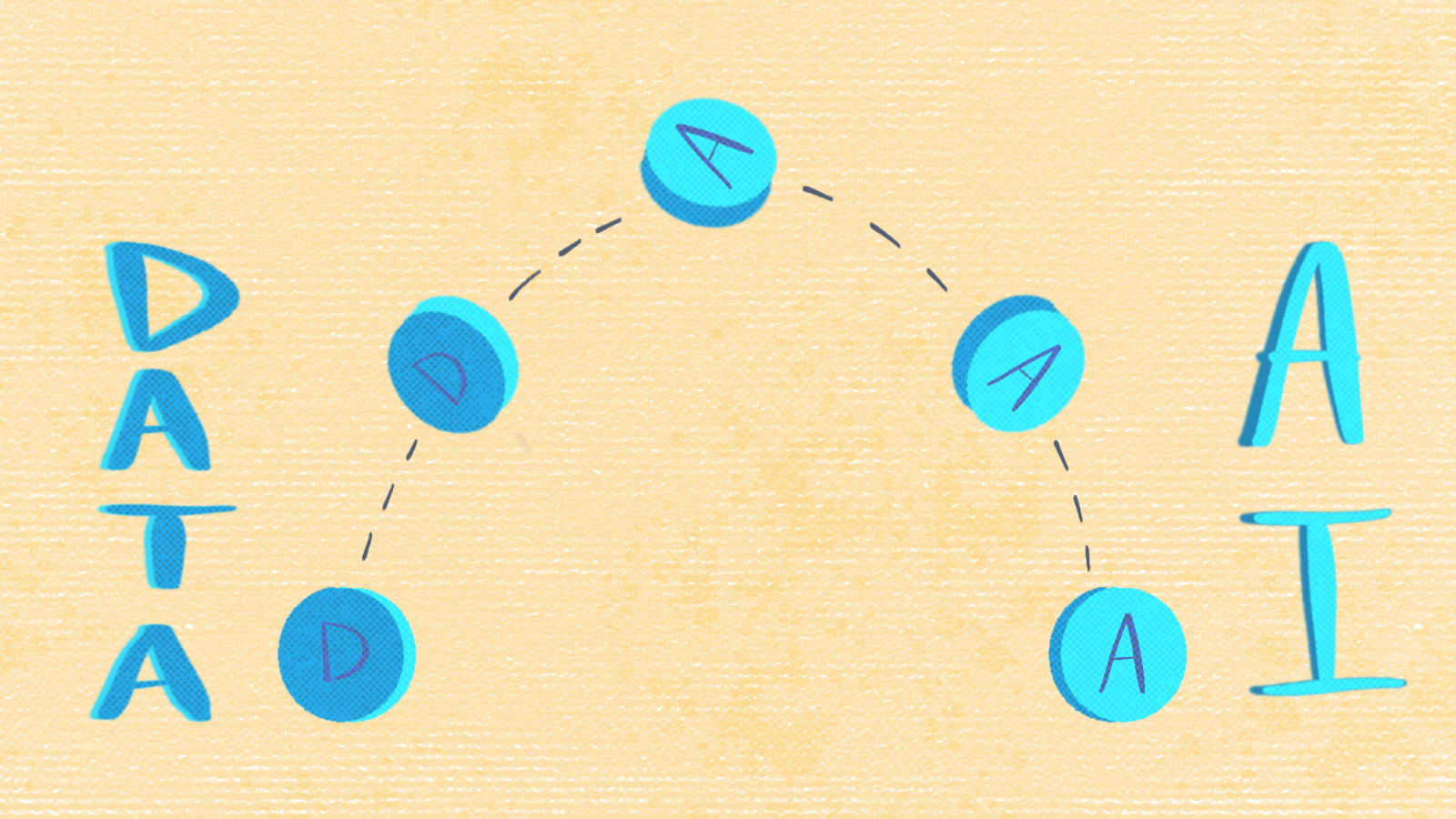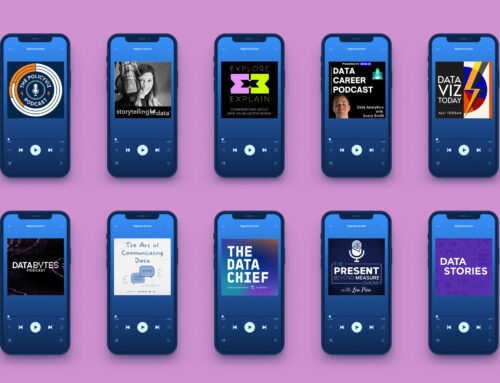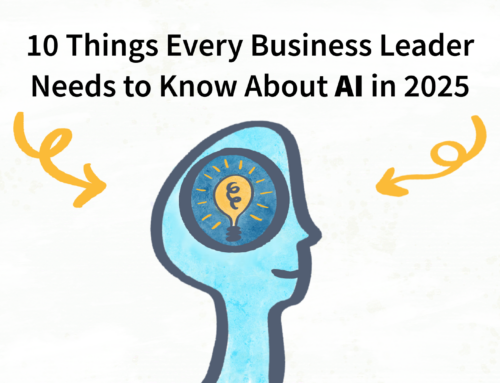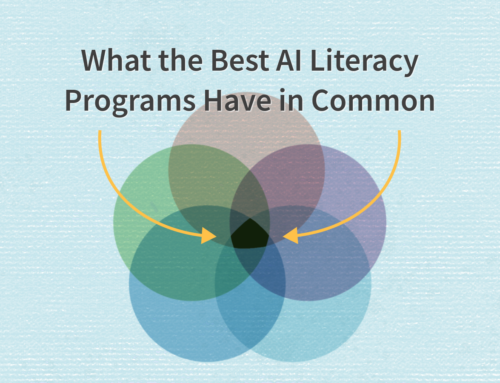Data Literacy and AI Literacy: Two Sides of the Same Coin
By Ben Jones, Co-Founder and CEO of Data Literacy
Recently, I initiated a discussion on LinkedIn about the relationship between data literacy and AI literacy. The conversation generated some very thoughtful responses from a handful of the most influential and experienced people in the data literacy world. What they had to say revealed important insights about these competency areas. Below, I’ve tried to compile, group, and synthesize the key themes that emerged, providing direct quotes from those who participated in the thread.
Will AI Literacy Last, or Is It Just Part of the Hype Cycle?
Many contributors expressed confidence that AI literacy is here to stay, seeing it as a foundational skill comparable to other technological literacies we’ve developed.
Elizabeth Rhoades, Ph.D., AI/ML Strategist at Department of Defense, predicts:
“I think that AI Literacy will grow into a lasting movement and it will have a meaningful impact on the world. It will not cool down at the onset of the next AI winter because the during the next AI winter, while we may not experience the drastic and quickly evolving advancements in AI capabilities we are seeing right now, AI will already be (even more so than it is today) integrated into our daily lives at home and at work and so the need for AI literacy will not simply disappear.”
Natalie Evans Harris, Maryland State Chief Data Officer, observes:
“AI literacy is more than a trend — it’s becoming a foundational skill, much like digital literacy did. As AI weaves deeper into our lives, the ability to understand and navigate it will shape who thrives in the future”
Zac Woodall, Product Management Leader in Data and SaaS, draws interesting parallels to other technological adaptations:
“AI literacy will be as important as mouse literacy, search literacy, or a driver’s license. Every now and then a tool comes along that changes the way we behave on a daily basis.”
Jennifer Ives, Global AI Growth Strategist, points out that successful implementation will determine impact:
“AI literacy will last because AI isn’t going anywhere. And impact depends on execution. If we treat AI literacy like a one-and-done training, it’ll fade. If we make it a continuous, real-world skill, it’ll stick.”
Chandra Donelson, Global Award-Winning Data Visionary, was concise in her assessment:
“AI literacy is here to stay.”
What Should an Effective AI Literacy Movement Include?
Contributors emphasized that AI literacy needs to be accessible, practically relevant, and connected to broader educational frameworks to be effective.
Elizabeth Rhoades highlighted the need for diverse, updated resources and human-centered considerations:
“For it to truly make a positive and lasting difference, I think the AI literacy movement needs to offer resources (articles, courses, podcasts, videos, etc) that are accessible to a wide range of demographics and these resources will need to be updated frequently to keep up with AI advancements. I also think that we need to do a better job of listening to users and considering the human factor and what levels of data provenance, transparency, explainability, and in some cases observability need to be integrated into AI capabilities to foster user trust and engagement. Without user trust, many AI capabilities, especially those that make decisions and have some level of autonomy will not be successfully adopted.”
Jennifer Ives stresses the practical aspects:
“For AI literacy to work, it has to be practical. We need to know when to trust AI, when to challenge it, and where it can go wrong. The biggest risk? Overhyped programs that create false confidence.”
Veronica Vilski, Content & Engagement Director at The Data Lodge, emphasizes the human dimension:
“How do we make it non-snake-oil? Talk to people and see what misconceptions are showing up. Make it simple, relatable, and personal! We need to embrace the people aspect of data and AI literacy to make it relevant and lasting.”
Anjana Manian, CEO & Co-founder of DIYA Research Inc., advocates for early integration into education:
“A key step in this evolution is ensuring that AI Literacy is introduced in K-12 education, at the very least in high school. Additionally, it is essential to recognize that Data & AI are inherently interdisciplinary. This mindset should be cultivated early on—just as foundational sciences and other core subjects are taught, a data-driven perspective should be incorporated wherever possible. By weaving AI and data literacy into education from an early stage, we can empower the next generation with the skills and ethical understanding necessary to navigate an AI-driven world.”
Bill Schmarzo, author of AI & Data Literacy: Empowering Citizens of Data Science, emphasizes simplicity:
“…AI & data literacy must not be overly-complex if we want everyone to understand how to thrive in a world of AI and data.”
What is Data Literacy’s Role in an AI-Focused World?
Nearly all participants viewed data literacy as the essential foundation for AI literacy, with many using the metaphor of “two sides of the same coin.”
Valerie A. Logan, Founder of The Data Lodge, argues for an inclusive approach:
“As you know, I’ve always taken a comprehensive stance with the term data literacy since my original research back in the day at Gartner. My position has always been to frame “data literacy” inclusive of not just understanding the “data” (types, sources, lineage, quality, etc.), but also the nature of the diverse methods of analysis/synthesis applied to data (as varied as a simple tabular report to the most advanced array of AI methods, models), and most importantly, the understanding of the problem you’re actually solving (business or agency acumen).”
She concludes:
“Now, with genAI and mainstream access/impact, it’s best to adapt to “data and AI literacy” to be explicit that these are part of 2 sides of the same coin., and that coin has value. Splitting the fields just causes (more) confusion.”
James Wilson, AI Ethicist and author of Artificial Negligence, directly echoes this sentiment:
“I think the overlap between Data and AI literacy is very high and AI Literacy without Data Literacy would be a flawed and potentially dangerous approach. They are two sides of the same coin.”
Sarah Nell-Rodriquez, Chief Learning Officer for Be Data Litt, describes the relationship as evolutionary:
“We often view AI as separate from data, but at its core, it’s not. Like any learning process, there’s a natural skill progression and depth to master. AI is both the next step and an expansion of data literacy—it simply doesn’t exist without data in all its varied forms. The foundational skills remain essential, and AI builds upon them. To me, it’s an evolution of what we’ve already been teaching, reinforcing the need for strong data literacy as the foundation.”
Elizabeth Rhoades articulates the logical sequence:
“I think the right approach is to view data literacy as a foundation for AI literacy. AI capabilities rely on data, so essentially without data, there is no AI. Therefore, individuals should understand data before attempting to use AI to analyze or interpret data, right? In my mind, the importance of AI literacy only amplifies the importance of data literacy. From what I’ve seen, those that attempt to delve into AI literacy without a foundation in data literacy, end up realizing fairly quickly that to truly be AI literate they need to be able to read and understand data first.”
Jennifer Daniell Belissent, Principal Data Strategist at Snowflake, notes the interdependence:
“The two are interdependent. Data literacy requires an understanding of how the data will be used. AI literacy requires an understanding of the data that powers it. Both are necessary in today’s world.”
Courtney Totten, Director of Community Learning Programs at Tableau, is direct:
“Data and AI Literacy are becoming core competencies necessary for a successful business and for life. Data Literacy is the foundation, it’s a non-negotiable.”
Jennifer Ives provides a vivid metaphor:
“Data literacy isn’t getting replaced — it’s getting promoted. AI without data literacy is like trusting a GPS without knowing how maps work. We don’t need to pick one —> we need to build both, together.”
Stéfano Carnevalli, Data Storyteller, highlights a practical challenge:
“Talking to some company CDAO professionals (here in Brazil), the biggest challenge with AI Literacy is the gap between Digital Literacy and Data Literacy. Many professionals use AI tools in companies without knowledge of basic digital tools (Web search, Excel, Word, for example). And without minimal knowledge in a journey of analyzing and using data.”
A Thought-Provoking Counterpoint: Are Data and AI Literacy Always Interdependent?
While most participants viewed data and AI literacy as inherently connected, Brent Dykes, Author of Effective Data Storytelling and Founder and Chief Data Storyteller at AnalyticsHero, LLC, offered a thoughtful counterpoint:
“I disagree that data and AI literacy are always interdependent. For data/analytics-related tasks, sure. But, there are many applications where AI literacy and data literacy don’t overlap. For example, if I’m a marketer creating content with GenAI, why must I be data literate for this specific task? I see AI literacy as being far broader than data literacy. Don’t get me wrong, I view them both as important, but I’m not convinced they go hand-in-hand outside of our field of data/analytics.”
Valerie Logan helped us begin to unravel the knot with a very insightful question:
“Let me start by asking you Brent… how do you define/scope “data literacy”? I can’t really comment without understanding that context from you.”
This sparked an enlightening exchange about what constitutes “data” and “data literacy” in the AI context. Elizabeth Rhoades argued that data literacy is still essential even for content creation:
“Data literacy skills would help no matter what the output is because it enables the user to understand the context in which the output was produced and the limitations of the AI’s recommendations. That requires data literacy, not just AI literacy, because the AI is in fact trained on specific data. Without data, there is not any AI.”
Brent maintained his position that domain expertise might be more relevant than data literacy in certain AI applications:
“In the use case I outlined the marketer is using AI to build copy for a landing page. The ‘data’ is content, not numbers such as customer data. There are no ‘insights’ to interpret. In this case, domain knowledge/expertise in producing marketing copy will help them assess which AI-generated copy is the best fit. I don’t see how data literacy plays a role.”
This discussion highlights an important point about how we define “data” itself. As I noted in the thread, the difference in perspective might stem from different understandings of what constitutes data:
“I believe you’re using the word ‘data’ to apply to what is contained in tables of numbers (you use the phrase ‘numbers such as customer data’). ‘Data literacy,’ in your usage, involves ‘data analysis and interpretation,’ to use your own words (or, what you call ‘the traditional sense’). Elizabeth and I (and potentially also Valerie and others on this thread, though I don’t want to speak for them) are embracing unstructured data sets such as text corpora and image repositories – the kind of data used to train genAI models. I believe that those who use AI chatbots – marketers, too – need to understand what that kind of data is, and how LLMs have been trained on it, so that they can avoid common misconceptions and pitfalls with AI.”
This exchange enriches our understanding of both data and AI literacy by challenging us to consider their boundaries and relationship. It suggests that our definitions of these terms may need to evolve as AI becomes more integrated into diverse professional contexts.
Conclusion
The discussion overwhelmingly pointed to the interconnected nature of data literacy and AI literacy. Rather than competing, they are complementary, with data literacy providing the essential foundation upon which AI literacy builds. As AI becomes more integrated into our personal and professional lives, developing both competencies will be crucial.
The consensus from these industry leaders suggests that organizations and educational institutions should prioritize a holistic approach to data and AI literacy—one that makes these skills accessible to everyone, regardless of technical background, and that emphasizes practical application, critical thinking, and ethical considerations.
As we go forward, the challenge will be to develop frameworks and resources that can keep pace with technological advancements while remaining accessible and relevant to diverse audiences. The work of helping people speak the combined language of data and AI has never been more important, and it’s clear that this work is just beginning.






